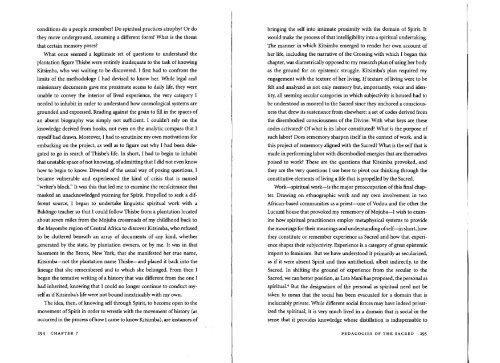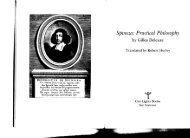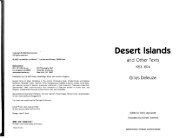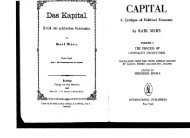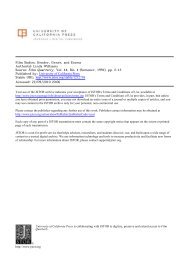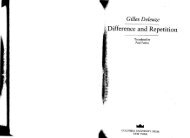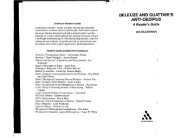Pedagogies - Una Chung
Pedagogies - Una Chung
Pedagogies - Una Chung
- No tags were found...
Create successful ePaper yourself
Turn your PDF publications into a flip-book with our unique Google optimized e-Paper software.
conditions do a people remember? Do spiritual practices atrophy? Or dothey move underground, assuming a different form? What is the threatthat certain memory poses?What once seemed a legitimate set of questions to understand theplantation figure Thisbe were entirely inadequate to the task ofknowingKitsimba, who was waiting to be discovered. I first had to confront thelimits of the methodology I had devised to know her. While legal andmissionary documents gave me proximate access to daily life, they wereunable to convey the interior of lived experience, the very category Ineeded to inhabit in order to understand how cosmological systems aregrounded and expressed. Reading against the grain to fill in the spaces ofan absent biography was simply not sufficient. I couldn't rely on theknowledge derived from books, not even on the analytic compass that Imyself had drawn. Moreover, I had to scrutinize my own motivations forembarking on the project, as well as to figure out why I had been delegatedto go in search of Thisbe's life. In short, I had to begin to inhabitthat unstable space ofnot knowing, ofadmitting that I did not even knowhow to begin to know. Divested of the usual way of posing questions, Ibecame vulnerable and experienced the kind of crisis that is named"writer's block." It was this that led me to examine the recalcitrance thatmasked an unacknowledged yearning for Spirit. Propelled to seek a differentsource, I began to undertake linguistic spiritual work with aBak6ngo teacher so that I could follow Thisbe from a plantation locatedabout seven miles from the Mojuba crossroads of my childhood back tothe Mayombe region of Central Africa to discover Kitsimba, who refusedto be cluttered beneath an array of documents of any kind, whethergenerated by the state, by plantation owners, or by me. It was in thatbasement in the Bronx, New York, that she manifested her true name,Kitsimba-not the plantation name Thisbe-and placed it back into thelineage that she remembered and to which she belonged. From then Ibegan the tentative writing of a history that was different from the one Ihad inherited, knowing that I could no longer continue to conduct myselfas if Kitsimba's life were not bound inextricably with my own.The idea, then, of knowing self through Spirit, to become open to themovement of Spirit in order to wrestle with the movement of history (asoccurred in the process ofhow I came to know Kitsimba), are instances of294 CHAPTER 7bringing the self into intimate proximity with the domain of Spirit. Itwould make the process ofthat intelligibility into a spiritual undertaking.The manner in which Kitsimba emerged to render her own account ofher life, including the narrative of the Crossing with which I began thischapter, was diametrically opposed to my research plan ofusing her bodyas 'the ground for an epistemic struggle. Kitsimba's plan required myengagement with the texture of her living. If texture of living were to befelt and analyzed as not only memory but, importantly, voice and identity,all seeming secular categories in which subjectivity is housed had tobe understood as moored to the Sacred since they anchored a consciousnessthat drew its sustenance from elsewhere: a set of codes derived fromthe disembodied consciousness of the Divine. With what keys are thesecodes activated? Of what is its labor constituted? What is the purpose ofsuch labor? Does rememory sharpen itself in the context of work, and isthis project of rememory aligned with the Sacred? What is the self that ismade in performing labor with disembodied energies that are themselvespoised to work? These are the questions that Kitsimba provoked, andthey are the very questions I use here to pivot our thinking through theconstitutive elements ofliving a life that is propelled by the Sacred.Work-spiritual work-is the major preoccupation ofthis final chapter.Drawing on ethnographic work and my own involvement in twoAfrican-based communities as a priest-one ofVodou and the other theLucumi house that provoked my rememory of Mojuba-I wish to examinehow spiritual practitioners employ metaphysical systems to providethe moorings for their meanings and understanding ofself-in short, howthey constitute or remember experience as Sacred and how that experienceshapes their subjectivity. Experience is a category of great epistemicimport to feminism. But we have understood it primarily as secularized,as if it were absent Spirit and thus antithetical, albeit indirectly, to theSacred. In shifting the ground of experience from the secular to theSacred, we can better position, as Lata Mani has proposed, the personal asspiritual. 4 But the designation of the personal as spiritual need not betaken to mean that the social has been evacuated for a domain that isineluctably private. While different social forces may have indeed privatizedthe spiritual, it is very much lived in a domain that is social in thesense that it provides knowledge whose distillation is indispensable toPEDAGOGIES OF THE SACRED 295


